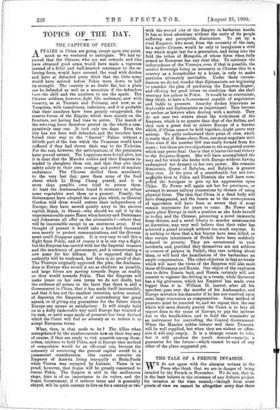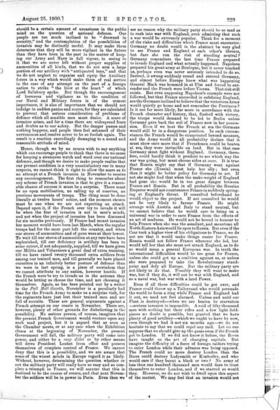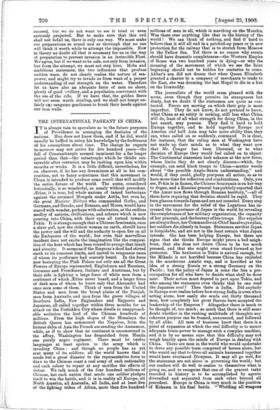THE TALK OF A FRENCH INVASION.
WE do not agree with the alarmist writers in the Press who think that we are in danger of being invaded by the French in November. We do not, that is, in the least believe in the existence of any definite project for invasion at the time named,—though from some points of view we cannot be altogether sorry that there should be a certain amount of uneasiness in the public mind on the question of national defence. Our people are too much inclined to be " drowned in security," and the contemplation of the possibilities of invasion may be distinctly useful. It may make them determine that they will be more vigilant in the future than they have been in the past in the matter of keep- ing our Army and Navy in full vigour, in seeing to it that we are never left without proper supplies of ammunition of all kinds, that we do not arm a large portion of our artillery with "antiquated toys," and that we do not neglect to organise and equip the Auxiliary forces in a way which would make them of real service in the case of any attempt on the part of a foreign nation to strike " the blow at the heart " of which Lord Salisbury spoke. But though the encouragement of keenness and vigilance as to the condition of our Naval and Military forces is of the utmost importance, it is also of importance that we should not indulge in sudden panics and scares, for they are calculated to prevent that serious consideration of problems of defence which all sensible men must desire. A scare of invasion arises, and for a time there are widespread fears and doubts as to our safety. But the danger passes and nothing happens, and people then feel ashamed of their nervousness and resolve never to be so foolish again. The result is a reaction exceedingly damaging to a sound and reasonable attitude of mind.
Hence, though we by no means wish to say anything which can encourage people to think that there is no cause for keeping a strenuous watch and ward over our national defences, and though we desire to make people realise that our present condition is a very unsatisfactory one in many respects, we cannot think it right to allow the scare as to an attempt at a French invasion in November to receive any encouragement. The first thing to remember about any scheme of French invasion is that to give it a reason- able chance of success it must be a surprise. There mast be no open mobilisation, no calling up of reserves, no previous movements of troops. The thing must be done literally at twelve hours' notice, and the moment chosen must be one when we are not expecting an attack. Depend upon it, if the French ever try to invade it will be when the fear of invasion is not in men's minds, and not when the project of invasion has been discussed for six months previously. If France had meant invasion her moment would have been last March, when the regular troops had for the most part left the country, and when our stores of ammunition and of guns were at their lowest. To wait till our stores of ammunition at any rate have been replenished, till our deficiency in artillery has been to some extent, if not adequately, supplied, till we have given our Militia and Volunteers a great deal of extra training, till we have raised twenty thousand extra soldiers from among our trained men, and till generally we have placed ourselves in an infinitely better posture of defence than we were in last spring, is a piece of unwisdom that we cannot attribute to any nation, however hostile. If the French were 'to try to invade us in the autumn they would be letting us choose the time, and not choosing it themselves. Again, as has been pointed out by a writer in the Pall Mall Gazette, November is a peculiarly bad time for the French Army to make us a surprise visit, for the regiments have just lost their trained men and are full of recruits. These are general arguments against a French attempt on our coasts in November. There are, however, plenty of other grounds for disbelieving in the possibility. No serious person, of course, imagines that the present French Government would venture upon any such mad project, but it is argued that as soon as the Chamber meets, or at any rate when the Exhibition closes at the beginning of November, the present Government will fall, the military party will come into power, and either by a coup d'etat or by other means will drive President Loubet from office and possess themselves of complete control of France. We cannot deny that this is a possibility, and we are aware that some of the wisest minds in Europe regard it as likely. Without, however, determining the question whether or not the military party will really have so easy and so com- plete a triumph in France, we will assume that this is destined to be the course of events, and that next Novem- ber the soldiers will be in power in Paris, Even then we
see no reason why the military party should be so mad as to rush into war with England, even admitting that such a war would be extremely popular. Think for a moment
of the risks and difficulties which France must encounter.• Germany no doubt would in the abstract be very glad to see France and England at each other's throats, but dare she run the risk of standing neutral ? Germany remembers the last time France prepared to invade England and what actually happened. Napoleon prepared his great army at Boulogne, but it never touched us, perhaps even was never seriously intended to do so. Instead, it swung suddenly round and entered Germany, and almost before Europe knew what was happening General Mack was hemmed in at Ulm and forced to sur- render and the French were before Vienna. That risk still exists. But even supposing Napoleon's example were not followed, but that France succeeded in subduing England, are the Germans inclined to believe that the victorious Army would quietly go home and not remember the Provinces? Is it not far more likely, far more in accordance with the French character and history, that, flushed with victory, the troops would demand to be led to Berlin unless Germany gave back the soil of France now in her posses- sion. Even if we beat the French at sea the Germans would still be in a dangerous position. In such circum- stances the French would be exasperated beyond measure, and the Army would in all probability declare that it must show once more that if Frenchmen could be beaten at sea, they were invincible on land. But in that case Germany must fight without England. Germany, there- fore, could hardly think it prudent to see which way the war was going, but must choose sides at once. It is true that Russia might say that if Germany went against France she (Russia) must help her ally ; but even then it might bo better policy for Germany to act. If not she might find that when the make-weight of England had gone she would be in too great danger between France and Russia. But in all probability the Russian Emperor would not countenance France in suddenly spring- ing at England's throat. If consulted beforehand he would object to the project. If not consulted he would not be very likely to favour France. He might arrange with Austria and Italy to stand neutral, but we cannot believe that he would care to bring on a universal war in order to save France from the effects of an act of madness. He would not be bound in honour to help France when she was the assailant, and meantime all North-Eastern Asia would lie open to Russia. But even if the Czar took a higher view of his obligations to France, we do not see that it would make things easier for France. Russia would not follow France wherever she led, but would tell her that she must not attack England, as to do so would mean a general European war. In truth the international difficulties would be too great for France, unless she could get up a coalition against us, or unless she were prepared to take the Revolutionary stand- point and defy all Europe. But the military party are not likely to do that. Possibly they will want to make war, but if they do, it will not be war with England, and so a naval war, but war with a land Power.
Even if all these difficulties could be got over, and France could throw up a Talleyrand who would persuade the world to form a ring while France and England had it out, we need not feel alarmed. Unless and until our Fleet is destroyed—when we are beaten by starvation —serious invasion is impossible. A raid of fifty thousand men with nothing but their rifles and a few light field- pieces no doubt is possible, but granted that we have plenty of good artillery—which we ought to have by now, even though we had it not six months ago—we do not hesitate to say that we could repel any raid. Let no one suppose that we should give up the game even if the French got to London. If we did not know it before, the Boers have taught us the art of changing capitals. But imagine the difficulty of a force of foreign raiders trying to enter London while their advance was being opposed. The French could no more destroy London than the Boers could destroy Ladysmith or Kimberley, and who would care if they burnt a block or two ? No army of less than one hundred thousand men would dare to trust themselves to enter London, and if we starved so would they. However, we do not wish to dwell upon this aspect of the mattef. We may feel that an invasion would not succeed, but we do not want to see it tried or even seriously projected. But to make sure that this evil shall not befall us, there is only one way. We must make our preparations so sound and so thorough that no one will think it worth while to attempt the impossible. Now in theory no doubt all that is necessary for us in the way of preparation to prevent invasion is an invincible Fleet. We agree, but if we want to be safe, not only from invasion, but from the attempt, we must not stop here. Mobs and ambitious statesmen, the two influences that produce sudden wars, do not clearly realise the nature of sea- power, and might try to invade us from want of a proper understanding of our strength on the water. Therefore let us have also an adequate force of men on shore, plenty of good artillery, and a population conversant with the use of the rifle. If we have that, the golden fleece will not seem worth stealing, and we shall not tempt un- fairly any sanguine gentlemen to break their heads against our iron walls.




































 Previous page
Previous page